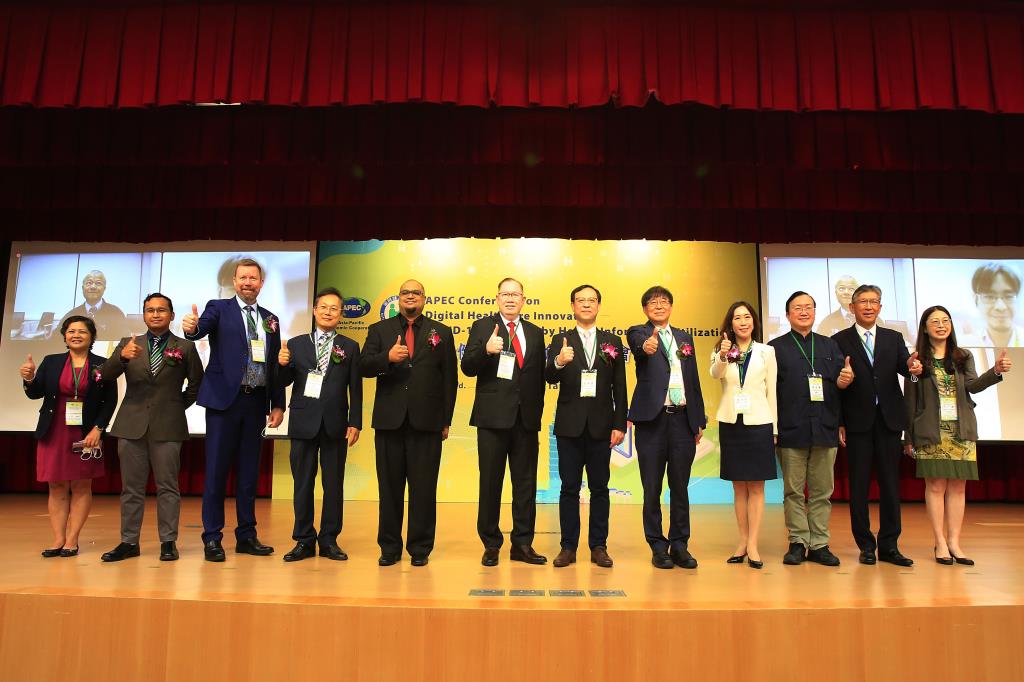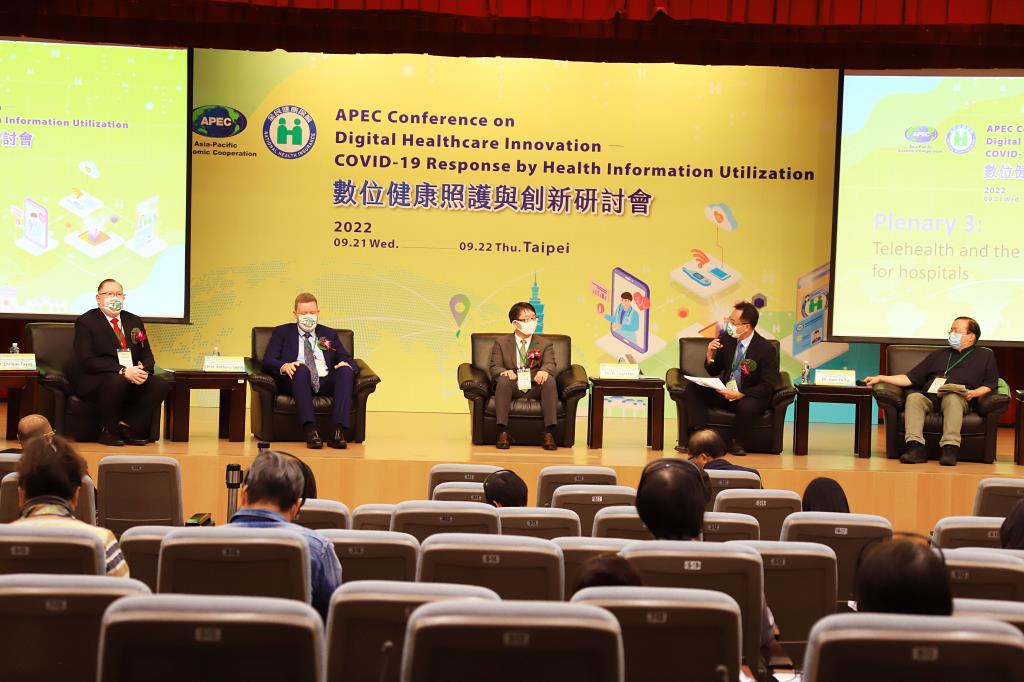The Asia-Pacific Economic Cooperation (APEC) is one of the most important multi-lateral official forums for economic cooperation in the Asia-Pacific region. In order to strengthen interaction and exchange of various economies, the NHIA applied to APEC for a project and received financial subsidies amounting to US$75,000 to hold the APEC Conference on Digital Healthcare Innovation — COVID-19 Response by Health Information Utilization on September 21-22, 2022.
This international conference took “Innovative Digital Healthcare Applications in the Pandemic” as its central topic and held discussions on four themes: “Digital transformation of healthcare and related innovations,” “New health policies and challenges in the post-pandemic era,” “Telehealth and the future for hospitals,” and “Bring artificial intelligence in action in healthcare.” On September 21, Deputy Minister Chung-Liang Shih of the Ministry of Health and Welfare delivered a speech at the opening ceremony, and Director-General Sharon S. N. Wu of the Ministry of Foreign Affairs' Department of International Organizations was also present to offer her congratulations; also invited were representatives of the health systems, industry, governments, and academia of many economies as plenary speakers.
Picture: Group photo
Plenary 1 Digital transformation of healthcare and related innovations
The first plenary session, “Digital transformation of healthcare and related innovations,” was moderated by Dr. Ray-Jade Chen, Chair Professor of Surgery of Taipei Medical University. The NHIA Director General Po-Chang Lee shared characteristics of Taiwan's NHI and the results of its application of digital health, such as test and examination images, building AI models with big data, and precision medicine. Dr. Maheshwara Rao A/L Appannan, Senior Principal Assistant Director of the Disease Control Division, Ministry of Health of Malaysia shared Malaysia’s digital pandemic monitoring system, virtual medical visits, precision medicine, and the revolution in medicine after the introduction of digital tools. Dr. Peter Chuanyi Hou, Assistant Professor of Emergency Medicine at Harvard Medical School, reporting online, spoke on the policy development, regulations, payment, and current state of telemedicine as it is used in the US.
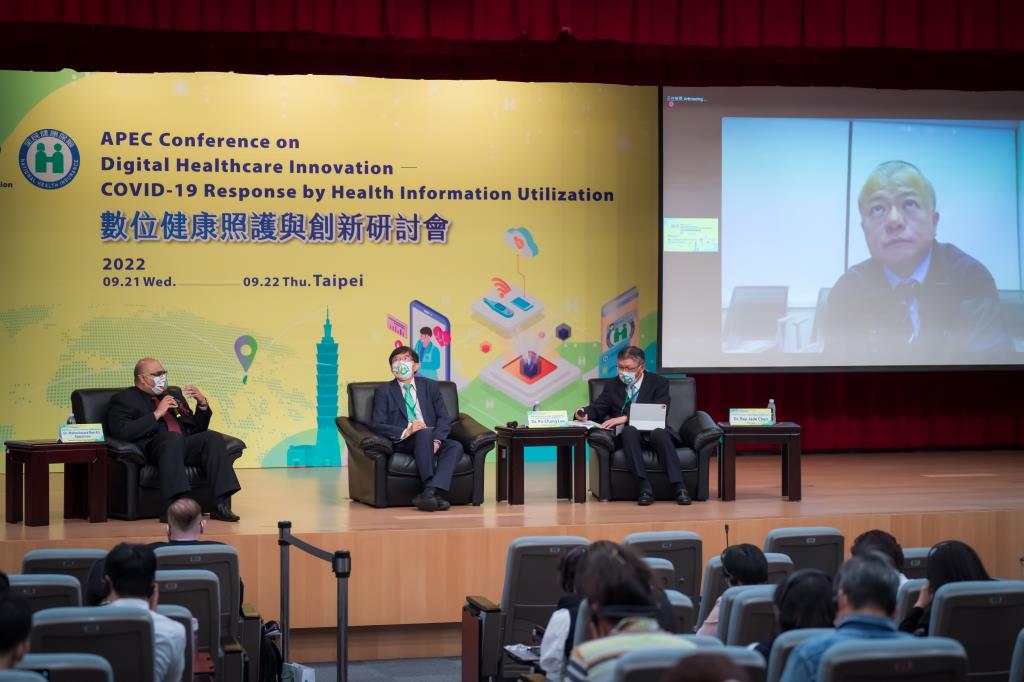
Picture: Photo of speakers from Plenary 1
Plenary 2 New health policies and challenges in the post-pandemic era
The second plenary session, “New health policies and challenges in the post-pandemic era,” was moderated by Dr. Jiun-Yu Yu, Associate Professor of the College of Management, National Taiwan University. Dr. Supharerk Thawillarp, Head of IT Unit, Division of Epidemiology, Ministry of Public Health of Thailand, described Thailand’s mobile phone application developed specifically for the pandemic—MorPrompt. Next, Dr. Jung-Hsien Chiang, Distinguished Professor and Chair of National Cheng Kung University Hospital IT Office, spoke on the NCKU team’s development of MedChex, software that uses AI to read chest X-rays and detect lung lesions from COVID-19. Then, Ted Chang, CTO of Quanta Computer and APEC ABAC Representative shared views on accelerating digital transformation.
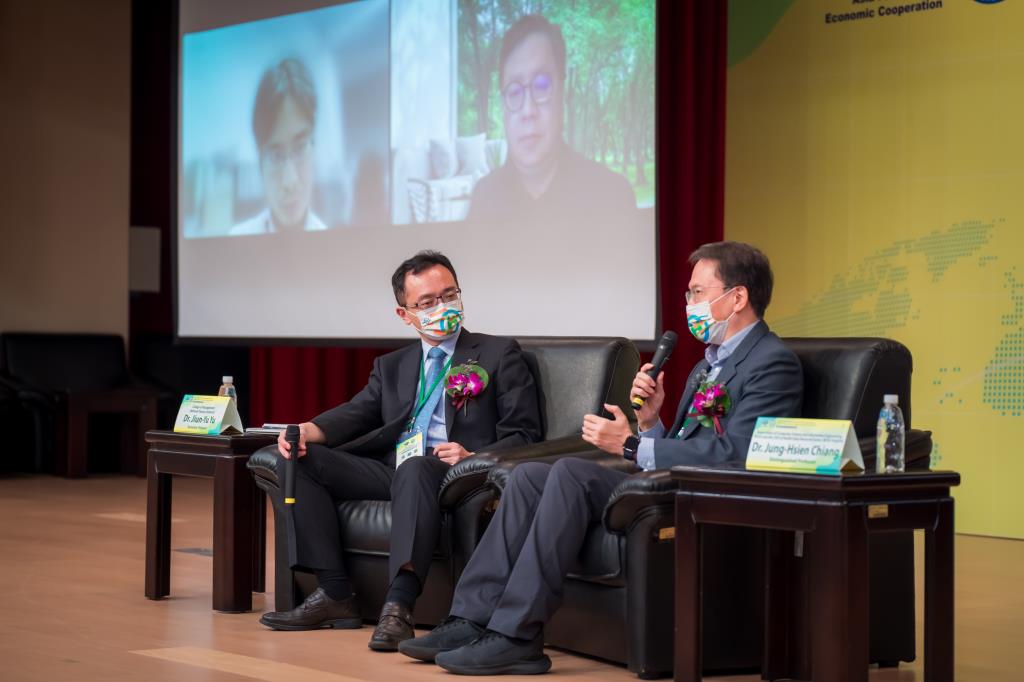
Picture: Photo of speakers from Plenary 2
Plenary 3 Telehealth and the future for hospitals
The third plenary session, "Telehealth and the future for hospitals,”was moderated by Dr. Jiun-Yu Yu, Associate Professor of the College of Management, National Taiwan University. Prof. Anthony Smith, Centre for Health Services Research of the University of Queensland and Adjunct Professor of Digital Health and Telehealth at the University of Southern Denmark, shared on the characteristics of telemedicine used in Australia. This was followed by Dr. Enrique Tayag, Director of Knowledge Management and Information Technology Service of the Philippine Department of Health, who described the development—as well as the challenges—of telemedicine in the Philippines, including development of IT and communications, labor, and regulations, as well as how to integrate with international organizations across borders. Lastly, Dr. Yi-Lwun Ho, Director of the National Taiwan University Hospital Telehealth Center, reported on the promotion of smart health in the metaverse among hospitals in Taiwan and how the metaverse can help hospitals build solutions.
Picture: Photo of speakers from Plenary 3
Plenary 4 Bring artificial intelligence in action in healthcare
The fourth plenary session, “Bring artificial intelligence in action in healthcare,” was moderated by Dr. Feipei Lai, Professor of the Department of Computer Science and Information Engineering, National Taiwan University. First to report in this plenary session was Dr. Padmini Murthy, Professor and Global Health Director at the School of Health Sciences and Practice at New York Medical College, USA, speaking on how the United Nations is using digital technology in promoting the SDGs, digital healthcare, and COVID-19, and further spoke on the challenges of digital healthcare in Europe. Speaking next was Mr. Takuro Umekita, Unit Chief under the Information Policy and Industrial Relations, Ministry of Health, Labour and Welfare, Japan, who shared the framework of Japanese MHLW’s AI applications in the medical, health, long-term care, and welfare fields; also, Umekita shared Japan’s experience in building pharmaceutical identification platforms using genetics and AI. Dr. Hyoung-Sun Jeong, Professor of Yonsei University, Korea, explained the current situation of AI in the Korean health care system and the introduction of digital medicine in its National Health Insurance system. Dr. Chang-Fu Kuo of Chang Gung Hospital reported on how hospitals in Taiwan have used AI-assisted medical inspection instruments and the process, results, and regulations of developing AI-assisted systems.
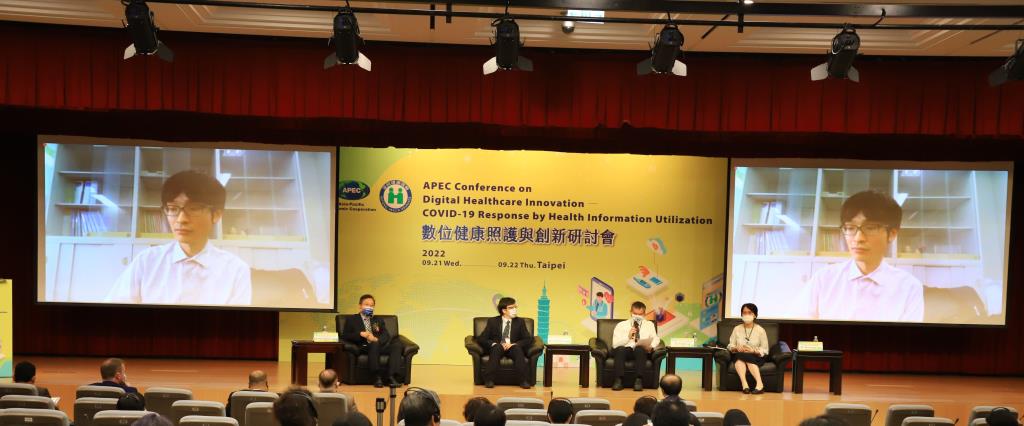
Picture: Photo of speakers from Plenary 4
In addition to the international conference, the NHIA also invited private organizations to set up in the exhibition site to jointly promote digital health. Several health technology companies, including impressive.cara, WaCare, Health2Sync, Syspower, Great Tree Pharmacy Co., Ltd., CMHU Big Data Center, and Lydia AI, displayed mobile applications using health insurance data. The exhibition perfectly displayed the results of public-private sector cooperation in the development of health science and technology. In addition, NHI MediCloud, Huijia Health Life Technology, Acer- Medical, Deep01 limited, Medicrowd Smarthealth Co., Ltd., Jello Biotech Inc., Dentist to Home, AREC Inc., and Sync Vision all displayed posters on site related to health technology. The NHIA also exhibited its newly published English-language book Digital Health Care In Taiwan at the exhibition venue, showing the promise and inexhaustible vitality of Taiwan's digital health technology.
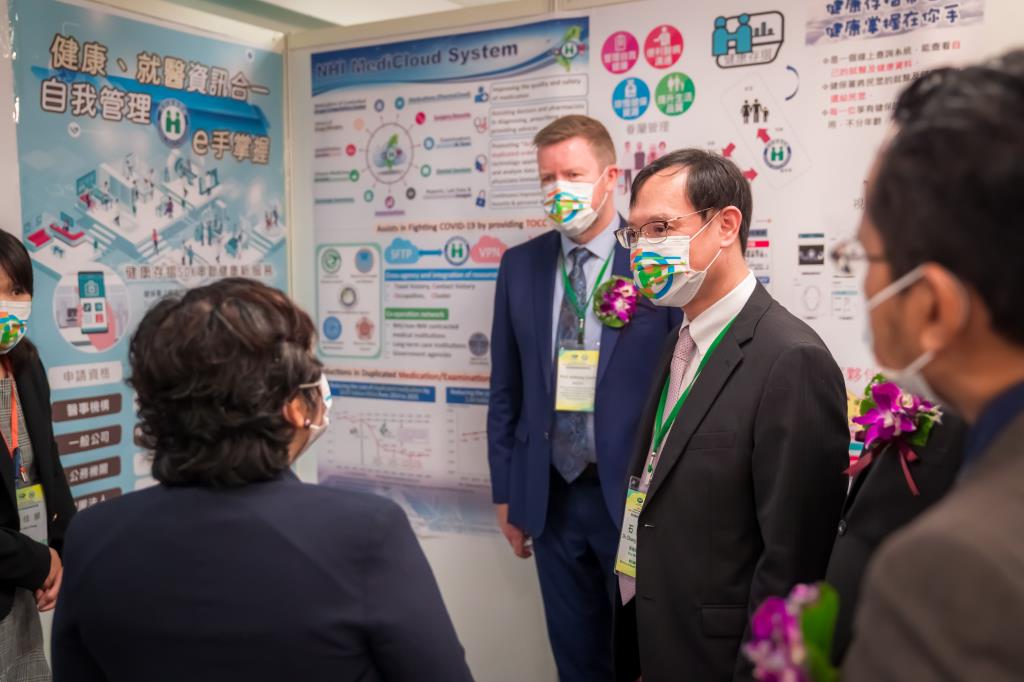
Picture: Photo of digital healthcare exhibition
Officials from APEC economies also participated in the conference, and the participation rate was more than 50% of the total (21) membership, including the United States, Japan, South Korea, Australia, Thailand, the Philippines, Malaysia, Canada, Mexico, Peru, and Indonesia. Aiming at helping participants understand the experiences of various economies in developing digital health care, the conference gathered approximately 600 enthusiastic attendees from industry, government, academia, students, and the public who are concerned about the development and trends of digital health care around the world. The conference distinctively embodied the many aspects of smart health care, the cross-disciplinary approach emphasized by APEC, and the public-private partnership that combines official and private resources. It also laid out a clear vision for the digital development of Taiwan's NHI and health care industry, while also taking the opportunity to share Taiwan's aptitudes with other countries and promote opportunities for further cooperation.
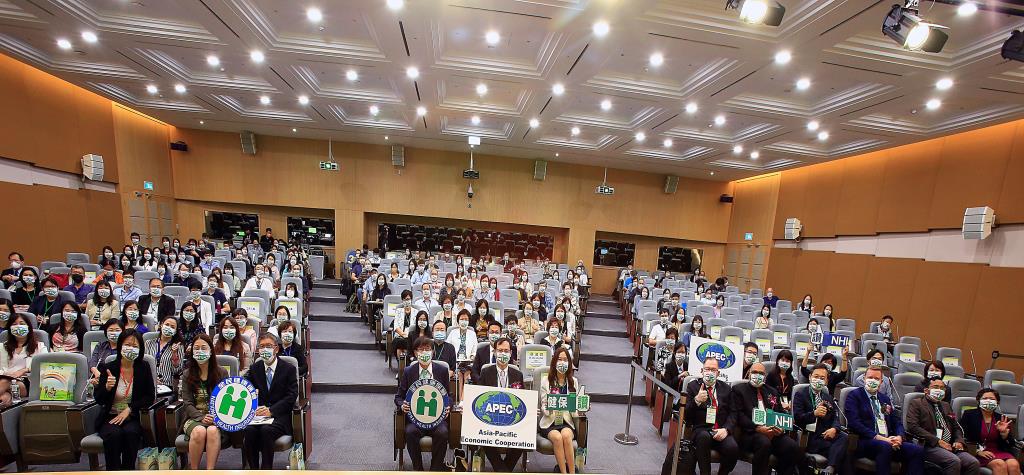
Picture: Group photo of attendees


